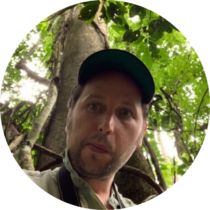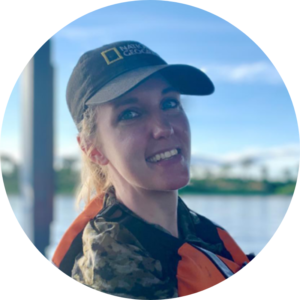Impacts of COVID-19 on Wildlife Trade, Health, and Climate
JULY 23, 2020 | 9-11AM (EST)
The recent emergence of zoonotic diseases – MERS, SARS, Ebola and Avian flu, and now COVID-19 – have affected human life in myriad ways. In this webinar, the first in a series for 2020 hosted by the Association for Tropical Biology and Conservation (ATBC) we invite three world experts in the fields of wildlife trade, one health, and climate change to assess the impacts of COVID-19, tell us how we can mitigate these impacts, and provide predictions for how biodiversity and wild places will be conserved in the future.
Moderators

Tony Lynam
Chair, ATBC Conservation Committee
Wildlife Conservation Society

Tim Bonebrake
ATBC Conservation Committee
The University of Hong Kong
| Time (EST) | Topic | Speaker |
| 9–9:25AM | COVID-19 and Wildlife Trade | Astrid Andersson |
| 9:25–9:50AM | COVID-19 and One Health | Lucy Keatts |
| 9:50–10:15AM | COVID-19 and Climate | Colin Carlson |
| 10:15–11AM | Q&A | All Speakers |
COVID-19 and Wildlife Trade
Astrid Andersson, The University of Hong Kong, Hong Kong | @AA_Andersson
 Increasingly intensive use of the natural world by humans is causing recurrent outbreaks of zoonotic disease. Wildlife trade, habitat encroachment, and industrial farming all see humans come in frequent, habitual contact with animals – and any viruses they may harbor. The COVID-19 pandemic has initiated urgent discussion among scientists, policymakers and conservationists on finding the origin of the virus, defining and regulating wildlife trade, and best practices to prevent future pandemics.
Increasingly intensive use of the natural world by humans is causing recurrent outbreaks of zoonotic disease. Wildlife trade, habitat encroachment, and industrial farming all see humans come in frequent, habitual contact with animals – and any viruses they may harbor. The COVID-19 pandemic has initiated urgent discussion among scientists, policymakers and conservationists on finding the origin of the virus, defining and regulating wildlife trade, and best practices to prevent future pandemics.
China is one of the first countries to implement measures to curtail wildlife trade in response to COVID-19, and has showcased the many difficulties associated with such action. Issues with purpose exemptions, economic compensation, and the practicalities of enforcement are manifold. For action to be truly effective however, it must go beyond China. Ultimately, we must collectively re-evaluate our relationship with, and use of, the natural world – and seize this opportunity to make long-term changes on both a domestic and international level, via existing frameworks. Only by effectively restricting wildlife trade, combatting wildlife crime, and protecting natural environments will we have a chance to prevent future pandemics, as well as safeguard human health and the global economy.
COVID-19 and One Health
Lucy Keatts, Wildlife Conservation Society, USA
 The current COVID-19 pandemic, caused by the SARS-CoV-2 virus, is having an unprecedented global impact on human health, livelihoods, economies, and behaviors. Evidence points to SARS-CoV-2 having a bat ancestral host. Almost three-quarters of recent zoonotic disease outbreaks in humans originated in wildlife with many, such as HIV, SARS, Nipah and Ebola, having arisen as the result of human disruption of nature through hunting and trade of wildlife, or land-use change and ecological degradation. The health of people, animals, plants, and their shared environment are inextricably and essentially linked.
The current COVID-19 pandemic, caused by the SARS-CoV-2 virus, is having an unprecedented global impact on human health, livelihoods, economies, and behaviors. Evidence points to SARS-CoV-2 having a bat ancestral host. Almost three-quarters of recent zoonotic disease outbreaks in humans originated in wildlife with many, such as HIV, SARS, Nipah and Ebola, having arisen as the result of human disruption of nature through hunting and trade of wildlife, or land-use change and ecological degradation. The health of people, animals, plants, and their shared environment are inextricably and essentially linked.
Emerging infectious diseases, such as COVID-19, threaten not just humans (and their security, food supplies, economies, and societies at large) but also the fauna and flora that comprise the biodiversity that supports the essential infrastructure of life on our planet. Humans have so far infected dogs, cats, mink, and large cats, with the SARS-CoV-2 virus. Other animal species, such as endangered Great Apes are likely susceptible. Concern for creation of wild reservoirs has led to a halt in bat research, and persecution of bats has occurred in some countries. Global GDP is estimated to be down more than 2%, and loss of livelihoods has led some to return to hunting to put food on the table. Poachers and loggers are exploiting decreases in ranger patrols in protected areas, threatening conservation efforts. These broad impacts on human and animal well-being and conservation indicate that a collaborative, dynamic, transdisciplinary One Health approach that incorporates pathogen, socio-economic, political, behavioral, evolutionary, and environmental factors is needed to understand and address the drivers and impacts of the current SARS-CoV-2 pandemic, and to reduce the risks of future disease emergence from wildlife.
COVID-19 and Climate
Colin Carlson, Georgetown University, USA | @wormmaps
 The COVID-19 pandemic and the emergence of SARS-CoV-2 is only the most recent in a long line of crises caused by the emergence of a wildlife virus. Despite the increasing availability of data about viral diversity in mammals, tracing and attributing any of these outbreaks to particular drivers or exposure pathways (e.g. land use change, wildlife trade, agricultural intensification) has remained difficult. Climate change will only further compound this pattern: species-on-the-move will bring pathogens and parasites into new environments, creating unexpected threats and new avenues for viral evolution. The thousands of cross-species transmission events we can project among range-shifting mammals will likely dwarf spillover events into humans, and will be largely undetected by current surveillance systems.
The COVID-19 pandemic and the emergence of SARS-CoV-2 is only the most recent in a long line of crises caused by the emergence of a wildlife virus. Despite the increasing availability of data about viral diversity in mammals, tracing and attributing any of these outbreaks to particular drivers or exposure pathways (e.g. land use change, wildlife trade, agricultural intensification) has remained difficult. Climate change will only further compound this pattern: species-on-the-move will bring pathogens and parasites into new environments, creating unexpected threats and new avenues for viral evolution. The thousands of cross-species transmission events we can project among range-shifting mammals will likely dwarf spillover events into humans, and will be largely undetected by current surveillance systems.
Although climate change will therefore almost certainly facilitate the emergence of novel zoonotic viruses, current evidence suggests that mitigating greenhouse gas emissions is unlikely to entirely solve that problem, particularly in the near term. Climate change adaptation needs a more comprehensive strategy for emerging zoonotic diseases and pandemic preparedness, focused on building capacity, open data sharing, fair international agreements (e.g., for vaccine allocation), and coordination with the global health community. In the meantime, we face an unprecedented set of challenges coordinating COVID-19 response in the middle of a climate emergency, and several natural disasters will collide with interventions in ways that require multi-sector coordination.
*ATBC Webinars are free, but you must be an ATBC member to register. In case you are not a member, please join/renew your ATBC membership today!!







Please sign in or register for FREE
If you are a registered user on WildHub, please sign in